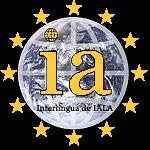Interlingua facts for kids
Quick facts for kids Interlingua |
||||
|---|---|---|---|---|

Logo
|
||||
| Pronunciation | IA: | |||
| Created by | International Auxiliary Language Association | |||
| Date | 1951 | |||
| Setting and usage | Scientific registration of international vocabulary; international auxiliary language | |||
| Users | 1,500 (2000) | |||
| Purpose |
International auxiliary language
|
|||
| Writing system | Latin script | |||
| Sources | Source languages: English, French, Italian, Portuguese, and Spanish, with reference to some other control languages (mainly German and Russian). | |||
| Official status | ||||
| Regulated by | No regulating body | |||
|
||||
Interlingua is a constructed language using words that are found in most West-European languages. It was made by IALA - a group of people (the most known was Alexander Gode) who worked on it for more than 20 years, and they finished and published the first dictionary in 1951. Interlingua was created on the base of languages: English, French, Spanish, Portuguese, and Italian.
Inter is the same root word as in the words "interaction", "interface" and so on, and it means "between" or "to each other"; lingua means "language". They chose the name Interlingua because they wanted it to be used for people of different countries to talk to each other easily. Because Interlingua was made by people to be easy, it is easier than natural languages to learn. As of 2000[update], 1,500 people knew Interlingua, and Interlingua speakers say that millions can understand it (read texts in it and listen to someone talk in it) without having to learn it first.
There are two other constructed languages in the world that have more than 1000 speakers, Esperanto and Ido. Those two were made before Interlingua. Some people think Esperanto and Ido are easy to learn because they have no exceptions (words that break the rules) but other people think Interlingua is easier because the makers chose all the words to be easy to understand for people who know English, French, Spanish, Portuguese, or Italian, plus languages like Occitan and Romanian, languages that used to be Latin, the language used in Rome a long time ago.
Actually, people who use Interlingua say that their language is actually new Latin, just simpler and modernized (made new).
Contents
Example text in Interlingua
Lingua natural e musical
de parolas international
e un grammatica minimal.
Comprensibile facilemente
per personas intelligente.
Le medio de communication
adequate pro le solution
del confusion de Babylon.
Pater Noster in Interlingua
| Interlingua | Basic English |
|---|---|
| Nostre Patre, qui es in le celos, que tu nomine sia sanctificate; que tu regno veni que tu voluntate sia facite super le terra como etiam in le celo. Da nos hodie nostre pan quotidian, e pardona a nos nostre debitas como nos pardona a nostre debitores, e non duce nos in tentation, sed libera nos del mal. |
Our father in heaven, may your name be kept holy. Let your kingdom come. Let your pleasure be done, as in heaven, so on earth. Give us this day bread for our needs. And make us free of our debts, as we have made free those who are in debt to us. And let us not be put to the test, but keep us safe from the Evil One. |
Related pages
- (Danish) (Interlingua) http://www.interlingua.dk/
Images for kids
See also
 In Spanish: Interlingua para niños
In Spanish: Interlingua para niños



